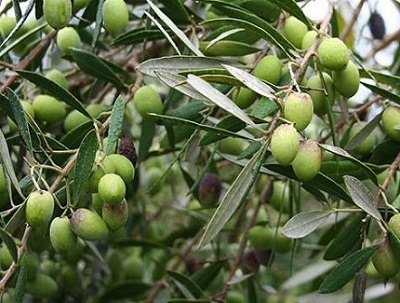Herbs And Phytochemicals: Oleuropein From Olive Leaf Can Help Against Colorectal Cancer
Nikhil Prasad Fact checked by:Thailand Medical News Team Jun 15, 2024 9 months, 3 weeks, 5 days, 17 hours, 13 minutes ago
Herbs And Phytochemicals: Olive leaves, often overlooked in favor of the fruit they bear, are rich in a compound called oleuropein. This natural substance is showing promise in the fight against colorectal cancer (CRC), a disease that affects millions worldwide. Recent
Herbs And Phytochemicals research by Italian scientists involving rats suggests that an antioxidant-rich extract from olive leaves can influence gut health and reduce cancer risk. Here's a closer look at the findings and what they could mean for future cancer treatments.
 Oleuropein From Olive Leaf Can Help Against Colorectal Cancer
The Power of Oleuropein
Oleuropein From Olive Leaf Can Help Against Colorectal Cancer
The Power of Oleuropein
Oleuropein, found abundantly in olive leaves, has been linked to several health benefits. Studies suggest it may help prevent or slow down the progression of colorectal cancer. Researchers are particularly interested in how oleuropein affects the gut microbiome - the community of bacteria living in our intestines -and various biomarkers in the blood that indicate health status.
The Study Setup
To explore oleuropein's potential, scientists conducted an experiment with a specific type of rat that is genetically prone to develop colorectal cancer. These rats, known as PIRC rats, were divided into two groups. One group received a standard diet, while the other group was fed a diet enriched with an oleuropein-rich leaf extract (ORLE). The experiment lasted one week.
Impact on Gut Bacteria
One of the key findings was that ORLE significantly altered the composition of gut bacteria in the rats. Healthy gut bacteria are crucial for overall health and can influence cancer risk. After just one week, the gut bacteria in the ORLE-fed rats showed notable changes compared to the control group. These changes included an increase in beneficial bacteria such as Paraprevotella and Oscillibacter, which are known for their anti-inflammatory properties and their role in maintaining gut health.
Changes in Blood Biomarkers
In addition to altering gut bacteria, ORLE also impacted various blood biomarkers. These are substances in the blood that can indicate the presence or progression of disease. The study found significant changes in several biomarkers linked to cancer and inflammation. For instance, levels of certain amino acids and fatty acids were altered, suggesting that ORLE may help regulate metabolic processes related to cancer progression.
Detailed Metabolomic Analysis
The researchers performed a detailed analysis of the blood samples to identify specific metabolites - small molecules involved in metabolism. They found that ORLE administration led to significant changes in the levels of several metabolites. These included increases in beneficial compounds like spermidine, which is known for its anti-inflammatory and anti-cancer properties. Conversely, harmful metabolites linked to cancer progression were reduced.
Promising Results for Can
cer Prevention
The results of this study are promising. They suggest that oleuropein-rich olive leaf extract could be a valuable natural supplement for preventing or slowing down colorectal cancer. By positively influencing gut bacteria and reducing harmful blood biomarkers, ORLE shows potential as a complementary therapy alongside conventional cancer treatments.
Future Research Directions
While the findings are encouraging, further research is needed to fully understand the mechanisms behind oleuropein's effects and to determine its effectiveness in humans. Future studies should include clinical trials with human participants to verify these results and explore the optimal dosage and duration of ORLE supplementation for cancer prevention.
Conclusion
The study highlights the potential of an antioxidant-rich extract from olive leaves in combating colorectal cancer. With its ability to modulate gut bacteria and influence key health biomarkers, oleuropein offers a promising natural approach to cancer prevention. As research continues, we may soon see olive leaf extract becoming a regular part of cancer prevention strategies, offering hope to millions worldwide.
Final Thoughts
Incorporating natural supplements like oleuropein into our diets could provide additional support in the fight against cancer. While it's not a cure-all, its potential benefits, especially when combined with other treatments, make it a subject worthy of further investigation. As always, it's essential to consult healthcare professionals before starting any new supplement regimen, particularly for individuals with existing health conditions or those undergoing cancer treatment.
This research adds to the growing body of evidence supporting the health benefits of natural compounds found in everyday plants. The humble olive leaf, long used in traditional medicine, may hold the key to new, more effective strategies for cancer prevention and overall health improvement.
The study findings were published in the peer reviewed journal: Antioxidants.
https://www.mdpi.com/2076-3921/13/6/724
For the latest on
Herbs And Phytochemicals, keep on logging to Thailand Medical News.
Read Also:
https://www.thailandmedical.news/news/health-news-largest-international-study-to-date,-reveals-that-folate-from-diet-including-leafy-vegetables-can-decrease-risk-of-colorectal-cancer
https://www.thailandmedical.news/news/breaking-study-shockingly-finds-that-all-whose-mothers-took-the-drug-bendectin-in-the-1960s-and-1970s-are-at-risk-of-colorectal-cancer
